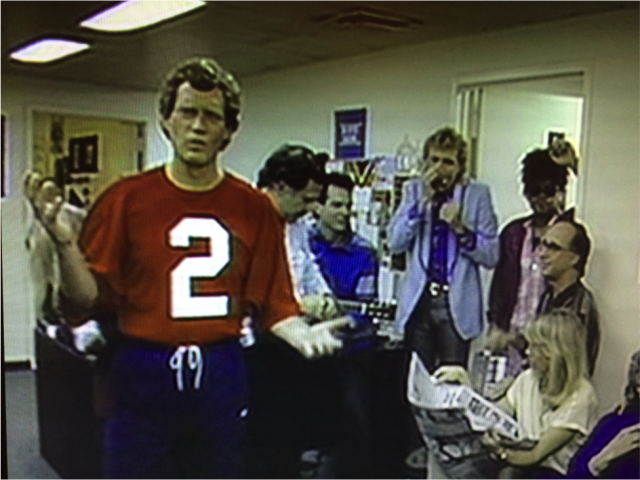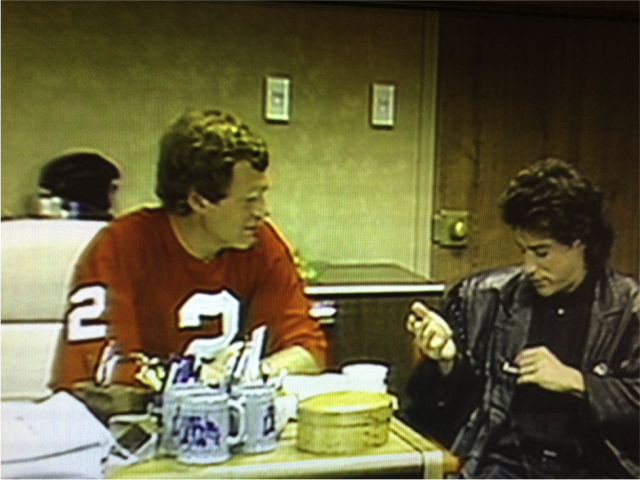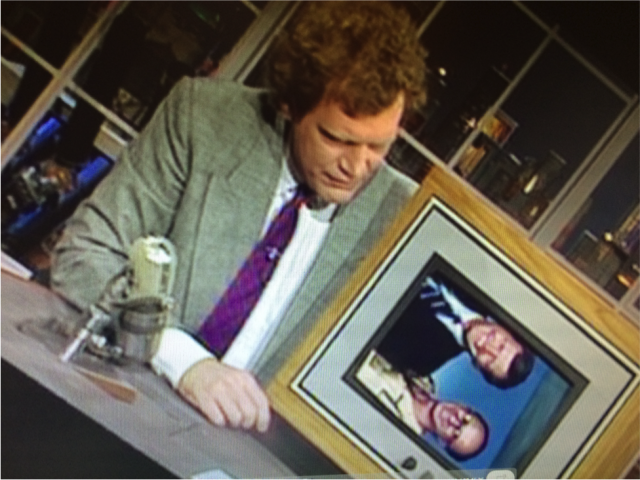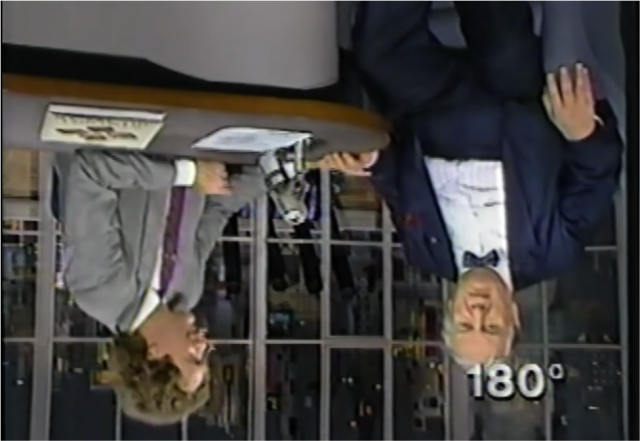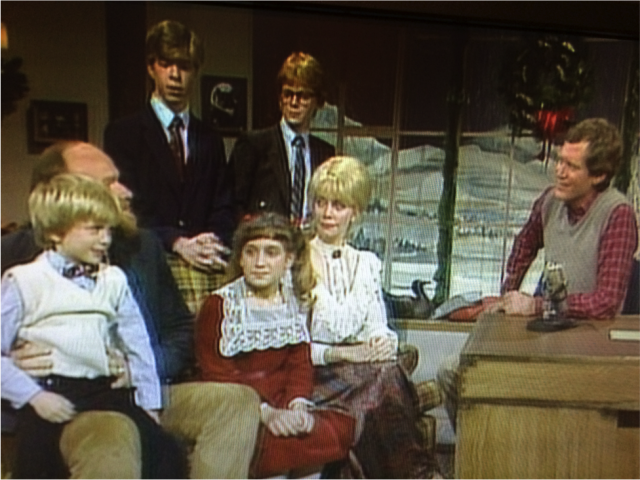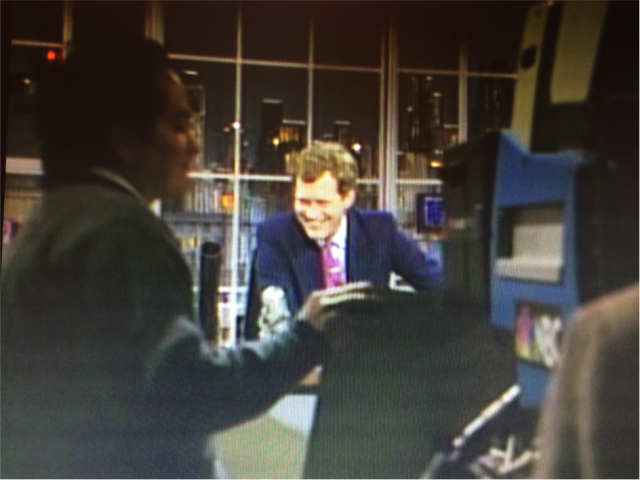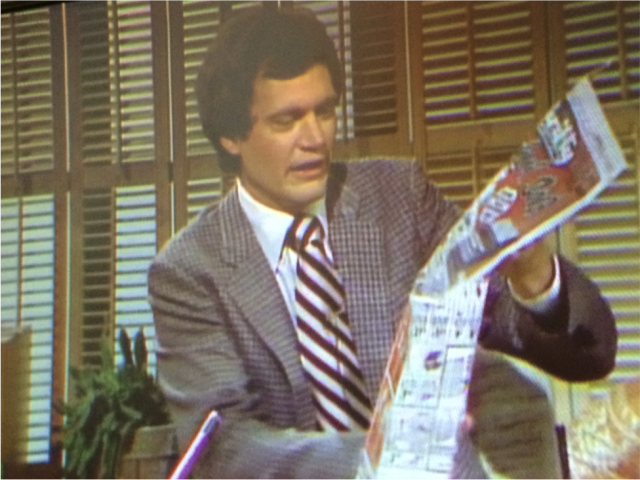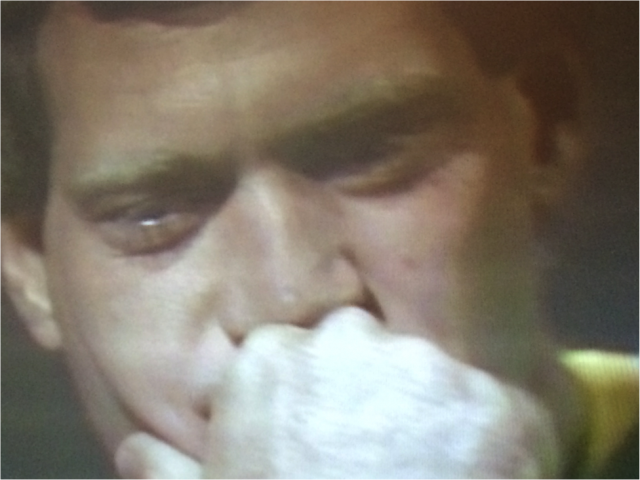Six Amazing Letterman Moments You’ve Probably Never Seen

David Letterman is retiring this Wednesday, May 20, but his three-plus decades of broadcasting will remain in TV history. Recently, I went to The Paley Center for Media in New York City. The Paley Center has in its archives over 160,000 programs, spanning almost 100 years of television. Some clips find their way to YouTube, but many of the episodes can only be seen in full at the Paley Center. They don’t have a lot of episodes from Letterman’s NBC career available, only about 15 have been made available to the public. (Apparently NBC has them under lock and key). And yet, people who Here are some fantastic Letterman shows from his early career that, those who grew up only seeing his CBS run, have probably never seen:
1. The Show From Letterman’s Office
“We’ve dismissed the studio audience. They’re on their way home,” Letterman said, pointing to a television monitor that shows people filing out of the studio mid-taping.
On November 20, 1985, Late Night aired an entire episode — entitled “Too Tired To Do A Show” — from their 14th floor offices. Letterman explained that the temperature in New York City was a record-setting 77 degrees, which is crazy for November. Without AC, the staff felt exhausted, so Letterman opted to do a show — “but we’re just not gonna do it in our studio.”
Letterman speaks to the camera in front of the staff, who were in turn standing behind the host, talking amongst themselves. After explaining the conceit of the show, Letterman turns to Paul Shaffer: “Paul, can you play the theme?” Shaffer, holding a small Casio keyboard, plays the intro music as Letterman stands there.
Letterman introduces the camera to some of his staffers, which would become a recurring bit on both Late Night and The Late Show on CBS. The behind-the-scenes glimpse includes Dave roaming the halls, talking to assistants, who seem bored; Chris Elliot, who Letterman sends home; and the writers, who are watching an episode of Diff’rent Strokes.
Letterman, with Paul trailing him with his keyboard, guides the camera into his office, where he sits behind his desk.
Robert Morton, Letterman’s segment producer, enters to tell Dave about his first guest, actress Teri Garr, a frequent guest on Late Night, who was there to promote her movie, After Hours.
“Good movie?” Letterman asks.
“It’s all right. It’s not great,” the producer says.
“Fine. Let’s just bring her out.” Letterman adds, before turning to the camera and saying:
“My first guest tonight is a titillating conversationalist, a fine actress, and one of my favorite guests. She can currently be seen in the wildly successful and entertaining movie, After Hours. Please say hello to Teri Garr!”
Garr shares standard talk-show anecdotes about flying in from L.A. and her acting career, before Letterman starts prodding her to take a shower in his office bathroom, while the show is ongoing. Garr debates it with herself, as they move on.
Letterman brings out Richard Lewis, who operates with no change in behavior. He does his jokes, talks about therapy, explains that he was nervous because he brought his mother to the show that night — even though she can’t watch at that moment, because it’s being filmed in Dave’s office.
Other stunts from that show include Letterman grabbing a bull horn and shouting out his window to people lining up for the Radio City Christmas Pageant that one of the camels in the show is highly contagious and having a pizza break for the staff mid-show.
At the end of the show, Letterman finally convinces Garr to take a shower. The show ends as Garr yells from the shower, “I hate you! Why am I doing this?”
2. The 360 Degree Rotation Show
On December 9, 1986, Letterman and his staff took what would otherwise have been a forgettable show and made it an absurdist standout. Throughout the episode, the camera gradually rotates so by the show’s end, it has turned an entire 360 degrees.
Letterman does not explain this stunt until after the monologue, leaving viewers to watch confused for the first ten minutes and figure it out for themselves. When he does clue in the audience, no reason is provided other than, “We’re rotating the image for your enjoyment at home.”
The few verbal references Letterman makes to the insane stunt just adds to the absurdity. The Top Ten List is completely unrelated — “Top Ten Adjectives Rarely Associated With NFL Linemen” — and also is impossible to read as he speeds through it at an awkward angle.
Letterman conducted the interviews as usual, with alarm interruptions at each quarter-rotation mark of 90, 180, and 270 for celebration. He wrapped up the interview with his first guest, British actor Sir Peter Ustinov, to celebrate the 180 degree rotation, when the image was completely upside-down. To celebrate the achievement, they cut to Larry “Bud” Melman in a tuxedo, top-hat, and cain dancing “on the ceiling”, in an upside-down customized set for several minutes.
The next guest was Mark Bauman, an executive from a retail outlet, who demonstrates different products to Dave that would make great holiday gifts. Letterman mocks these products, including a plant that plays a song when the plant is thirsty — that does not work in the demonstration, and their absurdly high prices. The executive just smiles and nods along.
The final guest is comedian George Miller, a favorite of Letterman’s. During the Miller interview, a computerized voice notifies them, “We have achieved 360 degrees. Complete image revolution. Everyone involved in tonight’s experiment will receive a lovely plaque.” The audience roars as Paul Shaffer plays a song he wrote for the occasion about what a wonderful feeling it is to rotate 360 degrees.
This episode was uploaded recently:
3. Christmas With The Lettermans
Late Night with David Letterman satirized holiday specials in, “Christmas With The Lettermans.” The episode, which aired on December 19, 1984, starred “the whole Letterman family,” which consisted of a fake-wife, “The lovely Audrey Daniels-Letterman,” and fake children, “The Letterman kids: Hank, Terry, Melissa, Kyle, plus Dave’s older brother Darrell!” The show opens with the Doodletown Pipers, a bland choir group, and the fake-family singing a campy rendition of “It Smells Like Christmas,” with Dave emerging in a Christmas sweater-vest. He interviews his fake-wife first, dryly saying, “This is exciting isn’t it, Audrey? It’s just like at the house!”
Dave’s sarcasm is bleeding through the show. When his two oldest fake-sons come out, Letterman greets them politely, saying, “You guys behave yourselves,” before turning to the audience. “They’re crazy. These guys are nuts, these kids!” He reveals to the audience the Letterman Christmas traditions, the first of which is the two oldest boys get to pluck one lollipop each from their famous, “lollipop tree,” a miniature plastic tree, as their gift. The next tradition is granting his fake-daughter Melissa one wish, which in this case was $50. The final tradition involved sending their youngest son, Kyle, no more than four years old, outside to find their Christmas tree. If Kyle finds a tree that is at least 7’ft tall, Letterman adds, he receives one solid gold coin.
“Now be really careful and get us a really nice tree and we’ll see you back in about an hour,” Letterman says to Kyle, before guiding the child out the door. Recurring throughout the rest of the episode is shots of the child wandering the streets, being chased by a street gang, and sawing down a tree.
One highlight includes the remaining three fake-kids begging their dad to sing them a song and set their special Christmas lighting just like they do at home. Letterman finally agrees, asking his director to give them Christmas lights, so he can sing to the kids. When the lighting adjusts, only Letterman is blacked out, as a clearly-recorded version of “Have Yourself A Merry Little Christmas” plays, with Letterman pantomiming singing in the shadows.
Toward the end of the show, little Kyle drags in a Christmas tree. Excited, the kids gather around as Letterman measures the tree, which tops off at just short of 7’ft. Letterman tells Kyle that it was a nice effort, but ultimately, he fell short, so daughter Melissa receives the gold coin. The audience starts loudly booing Letterman — tough to imagine on any talk-show today, much less a holiday special. Letterman shrugs off the angry audience, saying, “Ladies and gentlemen, I didn’t say it was fair. I said it was a tradition. We’ll be right back.”
Watch the special here:
4. 13 Cameras
“Tonight is camera night!” the announcer excitedly tells the audience. On March 1, 1988, Late Night decided that their usual four-camera set-up wasn’t cutting it, so they scrounged up nine more, for their very special 13-camera episode. Letterman told the audience that he wanted the extras cameras, to make sure the viewer does not miss even one second of “all of the action, the heartfelt drama, everything that gurgles and bubbles off of the screen and into your laps.”
He guides the viewers through each of the 13 cameras, as everyone sees how ridiculous it is. Camera #5 is a profile of Letterman in black and white. Camera #8 is Letterman’s back. Camera #9 is of the other cameras. Camera #11 is Letterman’s forehead. Camera #13 is on the ground, mounted on a stick, between Letterman’s legs.
The studio is too cramped for a camera set-up that does not overlap. The funniest moments, not even spoken, occur when many of the camera shots are plain blocked by other cameras. Once again, little reference is made throughout the episode. Letterman primarily operates as though an insane stunt is not being pulled. He interviews Tom Brokaw, then singer Belinda Carisle, as the camera occasionally cuts to bizarre angles throughout the episode.
At the end of the show, Letterman thanks Carlisle for stopping by, adding: “We had 13 cameras here tonight. One came in from California. Had to ship it in. Six grand to have that shipped in.” Carlisle barely nods, not acknowledging the comment, just turning her head away from the host. Letterman simply turns to the audience and says, “Goodnight.”
Here’s a clip of the start of Camera Night:
5. Dave in the Morning: No One Answers The Phone
Before becoming the longest-running late-night talk show host in television history, Letterman had a morning show on NBC that lasted for four months — from June to October of 1980. The David Letterman Show, which broadcast at 10am, was unlike most other morning programming, eschewing the primary viewership of middle-aged women for edgier jokes — much to the network’s and affiliates’ distaste. Critics loved the show, which won two Daytime Emmy Awards, including “Best Host” and “Best Writing,” but the show did not attract many viewers. Affiliates continued to drop the show during its run, until NBC had no choice but to cancel it.
One of the morning show episodes available in full at the Paley Center is from September 16, 1980. Letterman does an opening monologue, followed by a recurring segment, “Small Town News.” He reads headlines from small town newspapers in California, Nebraska, Indiana, and the last of which in a town called Stem, North Carolina (current population: 463). The Stem headline read, “One Law Enforcement Officer Works Good.” Letterman jokes, “Is that proper English? Close enough for Stem.” No laughs from the audience, though some gasps at the edgy Stem humor.
In a planned bit, Letterman decides to call the man in the article from Stem, actually dialing the number. The technology is such that the audience is unable to hear the dial tone, so we just see Letterman holding the phone after calling. The phone rings and rings and rings. No one answers. The bit is dead. Letterman awkwardly looks over at his producer. “Should we try it again or should we get on with it?” The producer tells Letterman that the bit is dead. “We’ll go to commercial,” Letterman says, scrambling. “Okay, wasn’t that plenty of fun?” Letterman says, shredding up the card to audience applause. “I guess you’ll just have to go down there to Stem and visit the man in person,” he quickly adds, again to no laughs.
It is fascinating to see Letterman in his early days as a television host, before he found his true place as an innovator of late-night and a man who could be relentless going after guests and his network. Upon returning back from commercial, Letterman apologized to the viewers of Stem.
Here is a different clip from Dave’s short-lived morning show:
6. Letterman Interviewed on Signature After Morning Show Cancelation
In October 1981, Letterman agreed to be a guest on a short-lived CBS show called Signature, hosted by Gregory Jackson. Only available at the Paley Center, the half-hour talk is easily one of the most fascinating and vulnerable clips of Letterman speaking. At this time, Letterman’s morning show had been off the air for nearly one year. NBC signed Letterman to a holding deal, but had not found a new time-slot for him, so Dave was in limbo, concerned that he would not get another chance to have his own show.
The interview is entirely close-ups of Letterman, as Jackson, the interviewer, asks fairly aggressive questions, with no audience. When Jackson speaks of the morning show, it sounds as if Letterman had committed a crime of some kind. Dave also appears to be choked up at certain points, when asked about the show’s failure and his career — which, at this point, had still been a meteoric rise, only having begun stand-up comedy in 1975.
Yet Letterman sounds defeated. When asked if he would like to have another network show, Letterman said, “Yeah, I would like to do that.” The interviewer then asked how Dave would “prevent this from happening again,” referring to the show’s cancelation. “I’d probably have to do it in Taiwan,” Letterman says, laughing. “I probably would not get into another daytime situation. Plus, you learn from your mistakes and hopefully you don’t make them again.”
The interviewer also said pointedly that Letterman seems like “a comic of true talent, kind of in search of a personality or an identity yet.” Letterman disputes that he views himself as a comic, saying, “By comic, I mean somebody who stands up in nightclubs and make drunks laugh.” Rather, he said, “I think my true identity or personality is more somebody who just hosts a TV show.” That statement is fascinating to hear. Letterman had hosted a canceled morning show for four months, yet already defined his entire personality and identity as a man “who just hosts a TV show.”
The host continues to press Letterman in the interview, asking what happens to “somebody like you, who essentially takes your identity from being a television personality, without a television show?” Letterman takes a long pause. “Well,” he sighs. “You adjust. Some people make can make furniture, so they make furniture. Some people can make people laugh, so they do that. I don’t think it’s all terribly mysterious.”
Letterman is pushed in follow-up questions. “How do you get through your days? I mean, isn’t it — what you really wanna do is be on television.” Letterman agrees. “And you’re not on television,” the interviewer emphasizes. “How do I get through my days? Like most of us, pills and whiskey. That’s about all you can do anymore.” He talked about how he got his start in entertainment at the Comedy Store, quickly getting hired by Jimmie Walker to write jokes for him, which earned him an agent and got him more attention from industry and spots on Johnny Carson’s Tonight Show, which within a few years he began guest-hosting. The host continued to remind Letterman of his morning show failure, even saying, “It’s a long way back to Indianapolis, isn’t it?” Letterman took all these punches thrown. Letterman acknowledged that the experience of having your own show “spoils you.” He added, “And anything less does not satiate one.”
The primary difference between Letterman then and now, other than age, appears to be his son, Harry. In announcing his retirement, Letterman told a story about going fishing with his son and spending his day trying to identify a bird that he and his son saw in the wild, implying that he had finally found another source of happiness. In between this interview and that 2014 announcement, he provided over three decades of late-night comedy.
Latest posts by Dan Perlman (see all)
- Ted TV: A Look at Ted Danson’s Amazing Comedy Television Career - October 14, 2015
- A Comic’s Life: Performing Comedy in New Orleans - October 12, 2015
- Tracy Morgan SNL Characters Ranked - August 18, 2015

